Job Design: Analyzing Employer Benefits and Job Performance Outcomes
VerifiedAdded on 2019/11/20
|10
|2454
|235
Essay
AI Summary
This essay examines the principles and strategies of job design, focusing on its benefits for employers and its influence on worker performance. It defines job design as the planning and rearrangement of work to enhance productivity and employee satisfaction, addressing issues arising from monotonous tasks. The essay explores various techniques like job enlargement, enrichment, and rotation, as well as the importance of employee autonomy and a healthy work environment. It emphasizes that job design defines the content and strategies of operations, impacting organizational structure and norms. The essay highlights how job design improves performance by making tasks more engaging, thereby motivating employees and increasing organizational productivity. It also explores the impact of environmental changes on job design and the role of the job characteristic model. Furthermore, the essay discusses strategies like job rotation, enlargement, and enrichment, and the underlying organizational theories, particularly the classical theory, which supports the essay's central argument that job design primarily benefits employers by enhancing job performance. The essay concludes by stating that job design is implemented to improve work conditions and quality, ultimately increasing employee productivity and benefiting the organization.
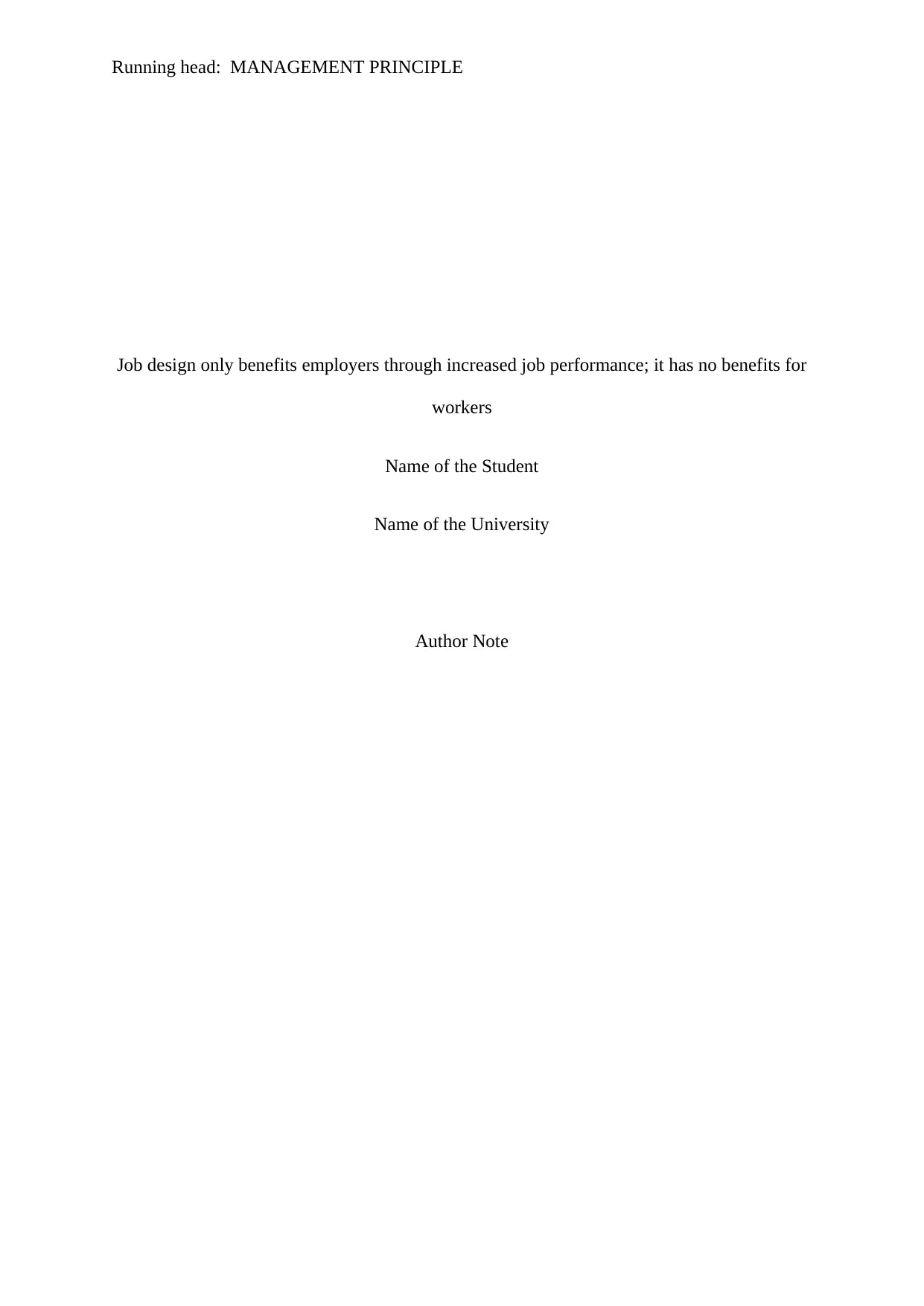
Running head: MANAGEMENT PRINCIPLE
Job design only benefits employers through increased job performance; it has no benefits for
workers
Name of the Student
Name of the University
Author Note
Job design only benefits employers through increased job performance; it has no benefits for
workers
Name of the Student
Name of the University
Author Note
Paraphrase This Document
Need a fresh take? Get an instant paraphrase of this document with our AI Paraphraser
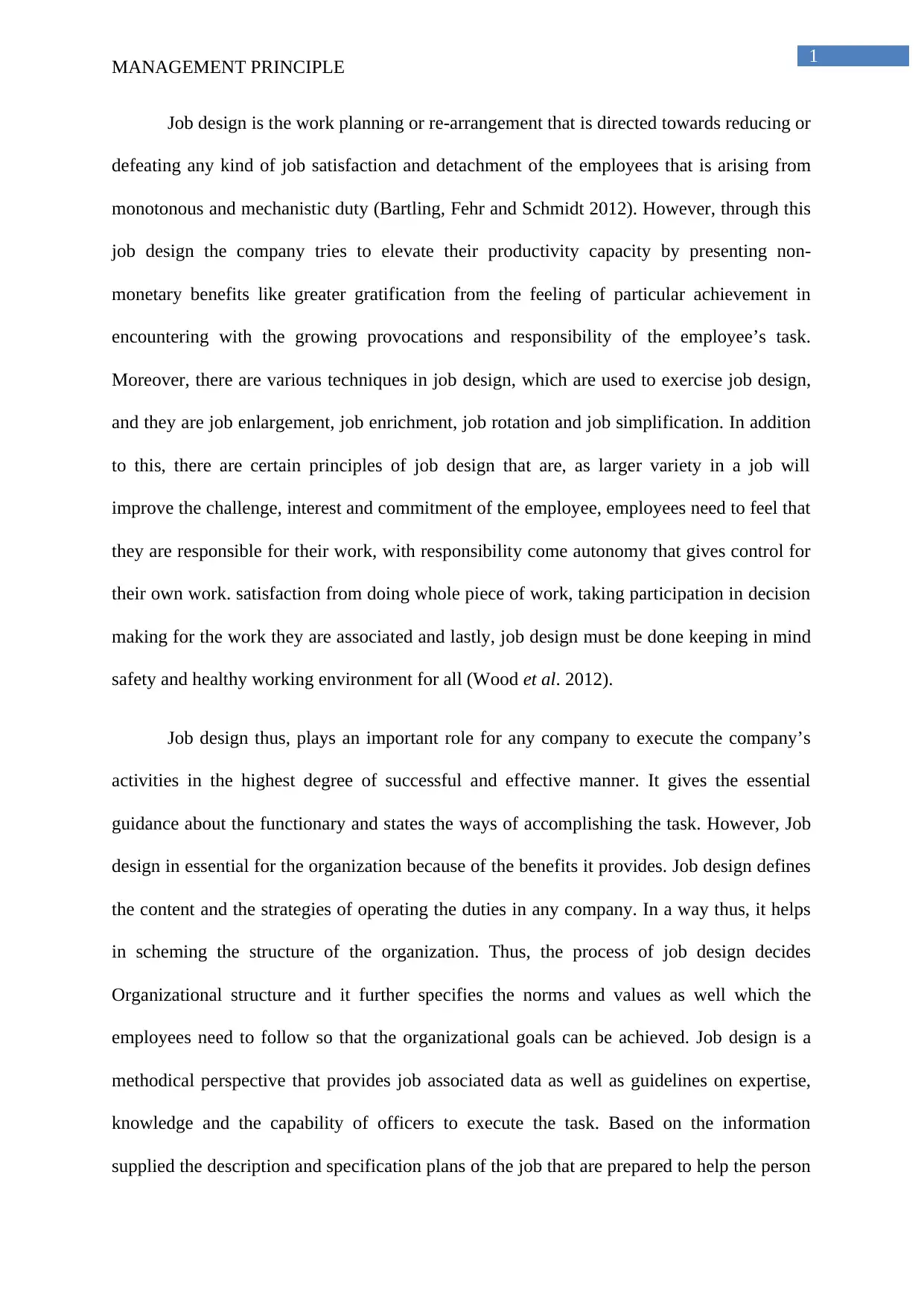
1
MANAGEMENT PRINCIPLE
Job design is the work planning or re-arrangement that is directed towards reducing or
defeating any kind of job satisfaction and detachment of the employees that is arising from
monotonous and mechanistic duty (Bartling, Fehr and Schmidt 2012). However, through this
job design the company tries to elevate their productivity capacity by presenting non-
monetary benefits like greater gratification from the feeling of particular achievement in
encountering with the growing provocations and responsibility of the employee’s task.
Moreover, there are various techniques in job design, which are used to exercise job design,
and they are job enlargement, job enrichment, job rotation and job simplification. In addition
to this, there are certain principles of job design that are, as larger variety in a job will
improve the challenge, interest and commitment of the employee, employees need to feel that
they are responsible for their work, with responsibility come autonomy that gives control for
their own work. satisfaction from doing whole piece of work, taking participation in decision
making for the work they are associated and lastly, job design must be done keeping in mind
safety and healthy working environment for all (Wood et al. 2012).
Job design thus, plays an important role for any company to execute the company’s
activities in the highest degree of successful and effective manner. It gives the essential
guidance about the functionary and states the ways of accomplishing the task. However, Job
design in essential for the organization because of the benefits it provides. Job design defines
the content and the strategies of operating the duties in any company. In a way thus, it helps
in scheming the structure of the organization. Thus, the process of job design decides
Organizational structure and it further specifies the norms and values as well which the
employees need to follow so that the organizational goals can be achieved. Job design is a
methodical perspective that provides job associated data as well as guidelines on expertise,
knowledge and the capability of officers to execute the task. Based on the information
supplied the description and specification plans of the job that are prepared to help the person
MANAGEMENT PRINCIPLE
Job design is the work planning or re-arrangement that is directed towards reducing or
defeating any kind of job satisfaction and detachment of the employees that is arising from
monotonous and mechanistic duty (Bartling, Fehr and Schmidt 2012). However, through this
job design the company tries to elevate their productivity capacity by presenting non-
monetary benefits like greater gratification from the feeling of particular achievement in
encountering with the growing provocations and responsibility of the employee’s task.
Moreover, there are various techniques in job design, which are used to exercise job design,
and they are job enlargement, job enrichment, job rotation and job simplification. In addition
to this, there are certain principles of job design that are, as larger variety in a job will
improve the challenge, interest and commitment of the employee, employees need to feel that
they are responsible for their work, with responsibility come autonomy that gives control for
their own work. satisfaction from doing whole piece of work, taking participation in decision
making for the work they are associated and lastly, job design must be done keeping in mind
safety and healthy working environment for all (Wood et al. 2012).
Job design thus, plays an important role for any company to execute the company’s
activities in the highest degree of successful and effective manner. It gives the essential
guidance about the functionary and states the ways of accomplishing the task. However, Job
design in essential for the organization because of the benefits it provides. Job design defines
the content and the strategies of operating the duties in any company. In a way thus, it helps
in scheming the structure of the organization. Thus, the process of job design decides
Organizational structure and it further specifies the norms and values as well which the
employees need to follow so that the organizational goals can be achieved. Job design is a
methodical perspective that provides job associated data as well as guidelines on expertise,
knowledge and the capability of officers to execute the task. Based on the information
supplied the description and specification plans of the job that are prepared to help the person
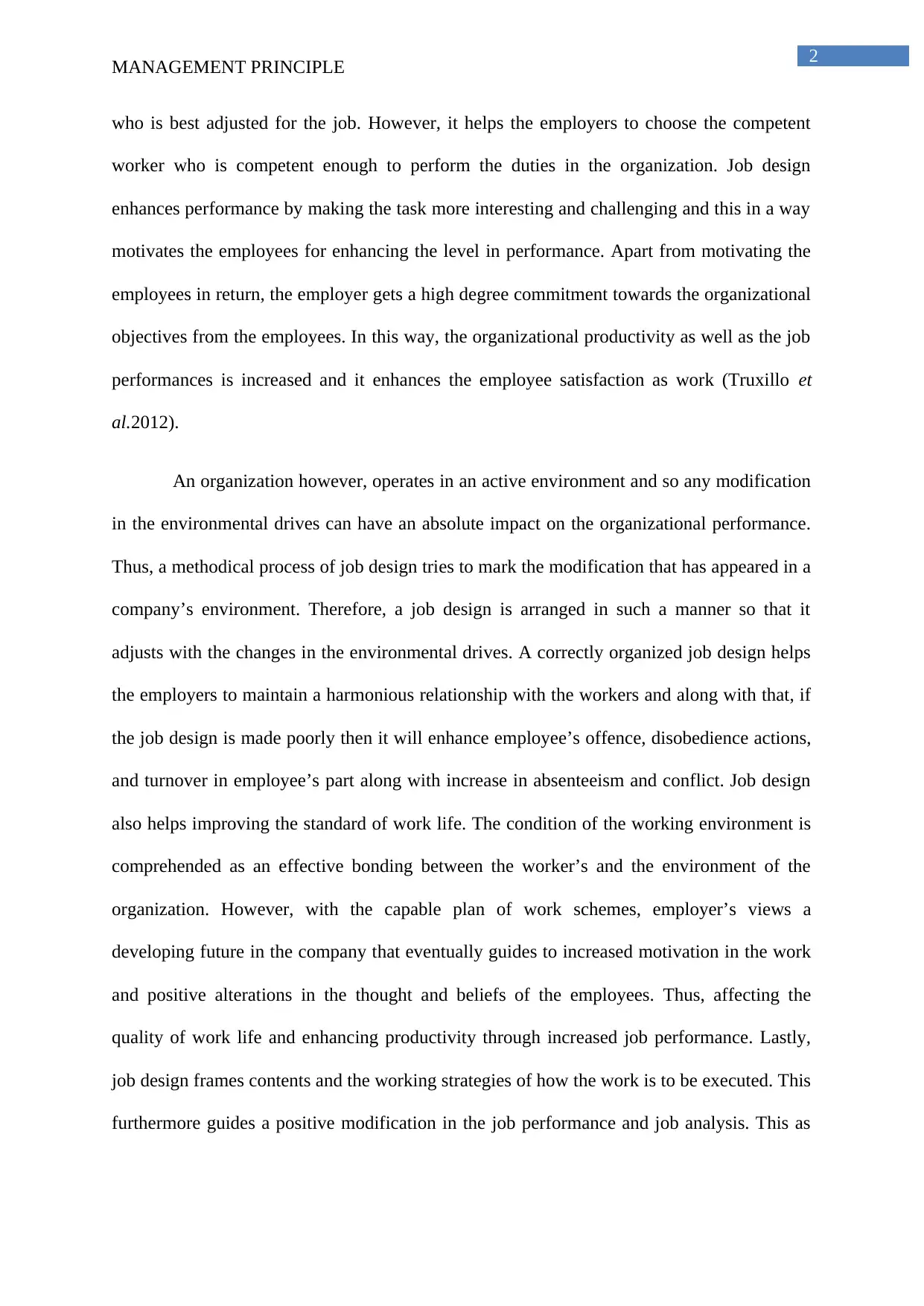
2
MANAGEMENT PRINCIPLE
who is best adjusted for the job. However, it helps the employers to choose the competent
worker who is competent enough to perform the duties in the organization. Job design
enhances performance by making the task more interesting and challenging and this in a way
motivates the employees for enhancing the level in performance. Apart from motivating the
employees in return, the employer gets a high degree commitment towards the organizational
objectives from the employees. In this way, the organizational productivity as well as the job
performances is increased and it enhances the employee satisfaction as work (Truxillo et
al.2012).
An organization however, operates in an active environment and so any modification
in the environmental drives can have an absolute impact on the organizational performance.
Thus, a methodical process of job design tries to mark the modification that has appeared in a
company’s environment. Therefore, a job design is arranged in such a manner so that it
adjusts with the changes in the environmental drives. A correctly organized job design helps
the employers to maintain a harmonious relationship with the workers and along with that, if
the job design is made poorly then it will enhance employee’s offence, disobedience actions,
and turnover in employee’s part along with increase in absenteeism and conflict. Job design
also helps improving the standard of work life. The condition of the working environment is
comprehended as an effective bonding between the worker’s and the environment of the
organization. However, with the capable plan of work schemes, employer’s views a
developing future in the company that eventually guides to increased motivation in the work
and positive alterations in the thought and beliefs of the employees. Thus, affecting the
quality of work life and enhancing productivity through increased job performance. Lastly,
job design frames contents and the working strategies of how the work is to be executed. This
furthermore guides a positive modification in the job performance and job analysis. This as
MANAGEMENT PRINCIPLE
who is best adjusted for the job. However, it helps the employers to choose the competent
worker who is competent enough to perform the duties in the organization. Job design
enhances performance by making the task more interesting and challenging and this in a way
motivates the employees for enhancing the level in performance. Apart from motivating the
employees in return, the employer gets a high degree commitment towards the organizational
objectives from the employees. In this way, the organizational productivity as well as the job
performances is increased and it enhances the employee satisfaction as work (Truxillo et
al.2012).
An organization however, operates in an active environment and so any modification
in the environmental drives can have an absolute impact on the organizational performance.
Thus, a methodical process of job design tries to mark the modification that has appeared in a
company’s environment. Therefore, a job design is arranged in such a manner so that it
adjusts with the changes in the environmental drives. A correctly organized job design helps
the employers to maintain a harmonious relationship with the workers and along with that, if
the job design is made poorly then it will enhance employee’s offence, disobedience actions,
and turnover in employee’s part along with increase in absenteeism and conflict. Job design
also helps improving the standard of work life. The condition of the working environment is
comprehended as an effective bonding between the worker’s and the environment of the
organization. However, with the capable plan of work schemes, employer’s views a
developing future in the company that eventually guides to increased motivation in the work
and positive alterations in the thought and beliefs of the employees. Thus, affecting the
quality of work life and enhancing productivity through increased job performance. Lastly,
job design frames contents and the working strategies of how the work is to be executed. This
furthermore guides a positive modification in the job performance and job analysis. This as
⊘ This is a preview!⊘
Do you want full access?
Subscribe today to unlock all pages.

Trusted by 1+ million students worldwide
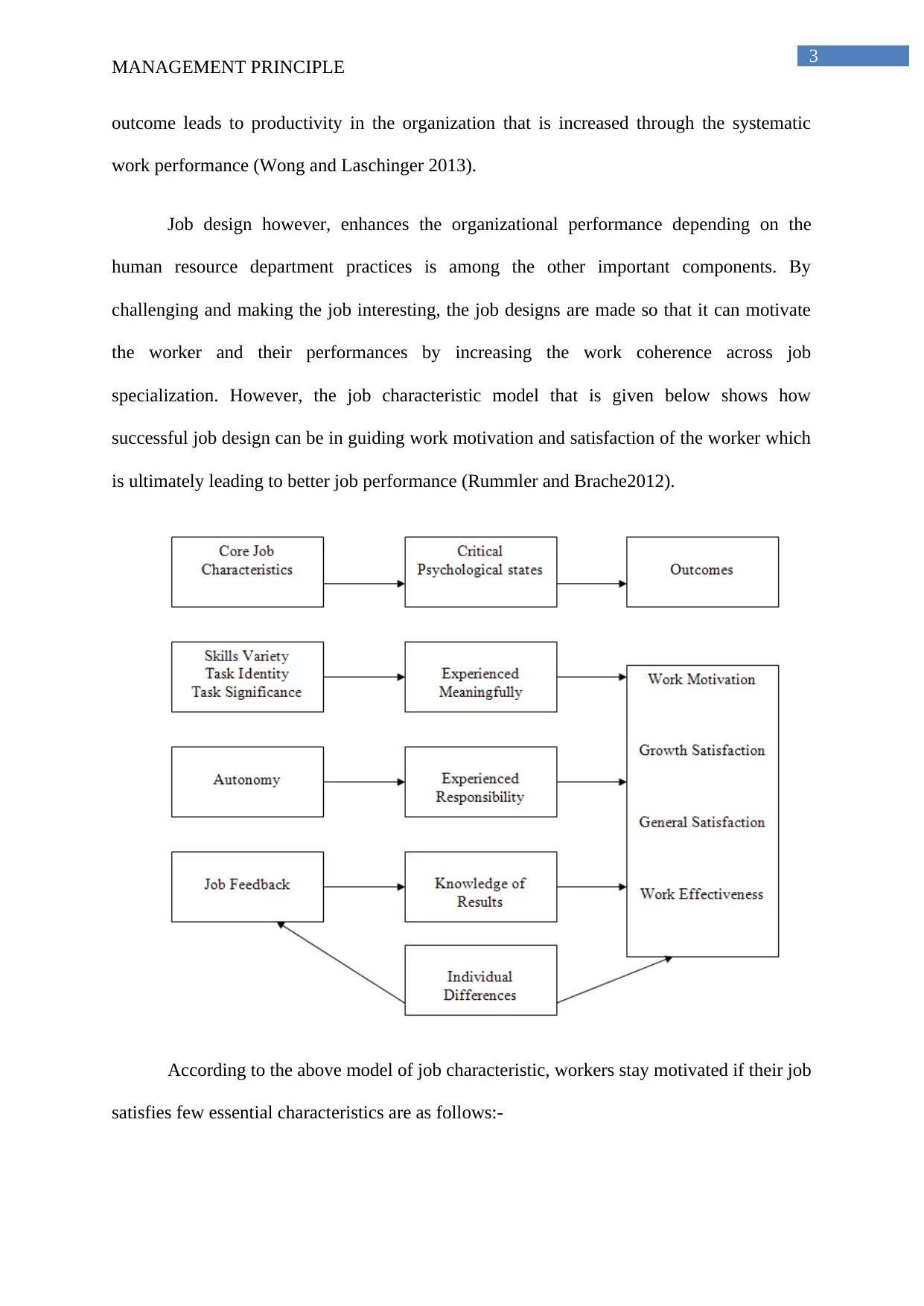
3
MANAGEMENT PRINCIPLE
outcome leads to productivity in the organization that is increased through the systematic
work performance (Wong and Laschinger 2013).
Job design however, enhances the organizational performance depending on the
human resource department practices is among the other important components. By
challenging and making the job interesting, the job designs are made so that it can motivate
the worker and their performances by increasing the work coherence across job
specialization. However, the job characteristic model that is given below shows how
successful job design can be in guiding work motivation and satisfaction of the worker which
is ultimately leading to better job performance (Rummler and Brache2012).
According to the above model of job characteristic, workers stay motivated if their job
satisfies few essential characteristics are as follows:-
MANAGEMENT PRINCIPLE
outcome leads to productivity in the organization that is increased through the systematic
work performance (Wong and Laschinger 2013).
Job design however, enhances the organizational performance depending on the
human resource department practices is among the other important components. By
challenging and making the job interesting, the job designs are made so that it can motivate
the worker and their performances by increasing the work coherence across job
specialization. However, the job characteristic model that is given below shows how
successful job design can be in guiding work motivation and satisfaction of the worker which
is ultimately leading to better job performance (Rummler and Brache2012).
According to the above model of job characteristic, workers stay motivated if their job
satisfies few essential characteristics are as follows:-
Paraphrase This Document
Need a fresh take? Get an instant paraphrase of this document with our AI Paraphraser
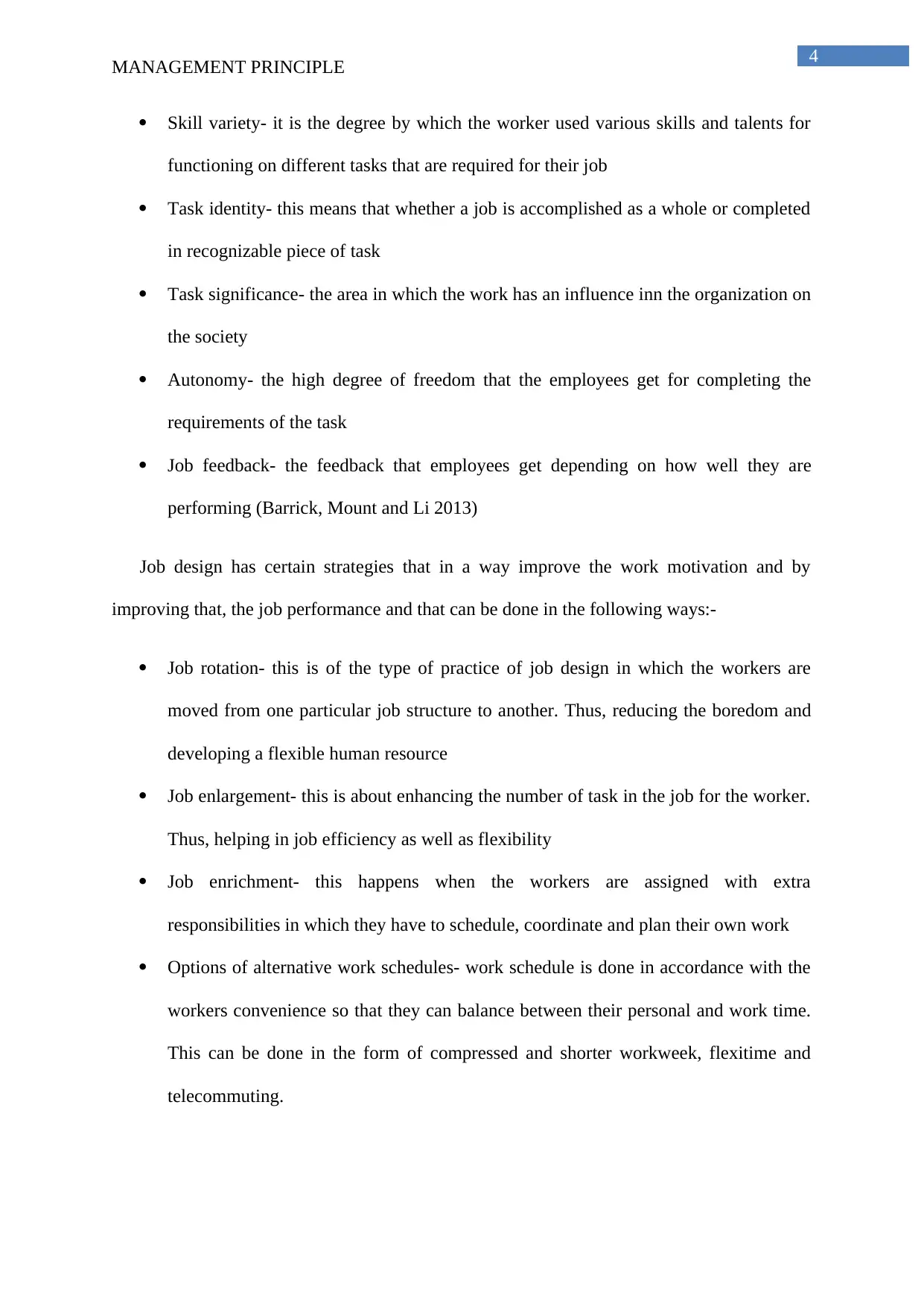
4
MANAGEMENT PRINCIPLE
Skill variety- it is the degree by which the worker used various skills and talents for
functioning on different tasks that are required for their job
Task identity- this means that whether a job is accomplished as a whole or completed
in recognizable piece of task
Task significance- the area in which the work has an influence inn the organization on
the society
Autonomy- the high degree of freedom that the employees get for completing the
requirements of the task
Job feedback- the feedback that employees get depending on how well they are
performing (Barrick, Mount and Li 2013)
Job design has certain strategies that in a way improve the work motivation and by
improving that, the job performance and that can be done in the following ways:-
Job rotation- this is of the type of practice of job design in which the workers are
moved from one particular job structure to another. Thus, reducing the boredom and
developing a flexible human resource
Job enlargement- this is about enhancing the number of task in the job for the worker.
Thus, helping in job efficiency as well as flexibility
Job enrichment- this happens when the workers are assigned with extra
responsibilities in which they have to schedule, coordinate and plan their own work
Options of alternative work schedules- work schedule is done in accordance with the
workers convenience so that they can balance between their personal and work time.
This can be done in the form of compressed and shorter workweek, flexitime and
telecommuting.
MANAGEMENT PRINCIPLE
Skill variety- it is the degree by which the worker used various skills and talents for
functioning on different tasks that are required for their job
Task identity- this means that whether a job is accomplished as a whole or completed
in recognizable piece of task
Task significance- the area in which the work has an influence inn the organization on
the society
Autonomy- the high degree of freedom that the employees get for completing the
requirements of the task
Job feedback- the feedback that employees get depending on how well they are
performing (Barrick, Mount and Li 2013)
Job design has certain strategies that in a way improve the work motivation and by
improving that, the job performance and that can be done in the following ways:-
Job rotation- this is of the type of practice of job design in which the workers are
moved from one particular job structure to another. Thus, reducing the boredom and
developing a flexible human resource
Job enlargement- this is about enhancing the number of task in the job for the worker.
Thus, helping in job efficiency as well as flexibility
Job enrichment- this happens when the workers are assigned with extra
responsibilities in which they have to schedule, coordinate and plan their own work
Options of alternative work schedules- work schedule is done in accordance with the
workers convenience so that they can balance between their personal and work time.
This can be done in the form of compressed and shorter workweek, flexitime and
telecommuting.
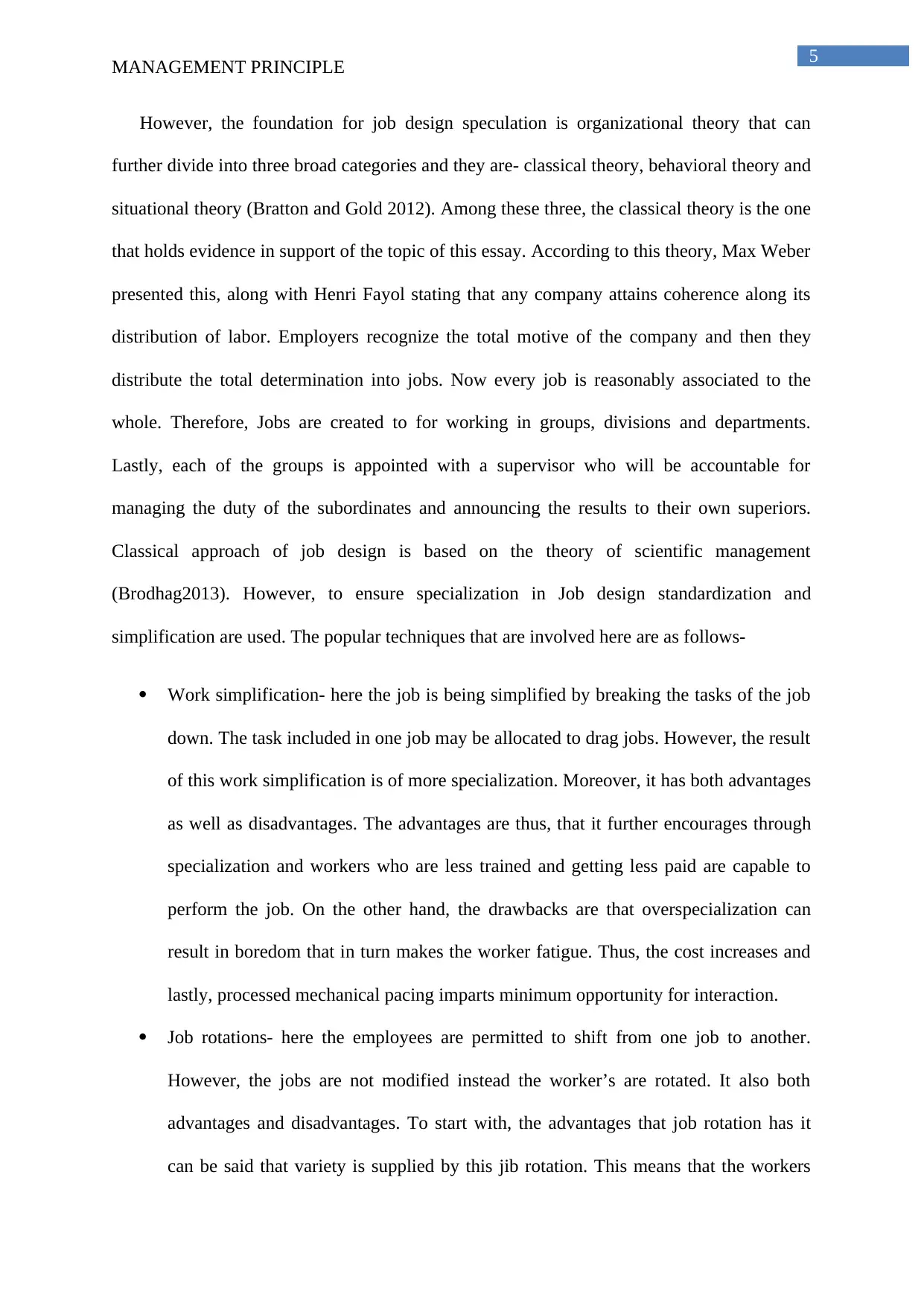
5
MANAGEMENT PRINCIPLE
However, the foundation for job design speculation is organizational theory that can
further divide into three broad categories and they are- classical theory, behavioral theory and
situational theory (Bratton and Gold 2012). Among these three, the classical theory is the one
that holds evidence in support of the topic of this essay. According to this theory, Max Weber
presented this, along with Henri Fayol stating that any company attains coherence along its
distribution of labor. Employers recognize the total motive of the company and then they
distribute the total determination into jobs. Now every job is reasonably associated to the
whole. Therefore, Jobs are created to for working in groups, divisions and departments.
Lastly, each of the groups is appointed with a supervisor who will be accountable for
managing the duty of the subordinates and announcing the results to their own superiors.
Classical approach of job design is based on the theory of scientific management
(Brodhag2013). However, to ensure specialization in Job design standardization and
simplification are used. The popular techniques that are involved here are as follows-
Work simplification- here the job is being simplified by breaking the tasks of the job
down. The task included in one job may be allocated to drag jobs. However, the result
of this work simplification is of more specialization. Moreover, it has both advantages
as well as disadvantages. The advantages are thus, that it further encourages through
specialization and workers who are less trained and getting less paid are capable to
perform the job. On the other hand, the drawbacks are that overspecialization can
result in boredom that in turn makes the worker fatigue. Thus, the cost increases and
lastly, processed mechanical pacing imparts minimum opportunity for interaction.
Job rotations- here the employees are permitted to shift from one job to another.
However, the jobs are not modified instead the worker’s are rotated. It also both
advantages and disadvantages. To start with, the advantages that job rotation has it
can be said that variety is supplied by this jib rotation. This means that the workers
MANAGEMENT PRINCIPLE
However, the foundation for job design speculation is organizational theory that can
further divide into three broad categories and they are- classical theory, behavioral theory and
situational theory (Bratton and Gold 2012). Among these three, the classical theory is the one
that holds evidence in support of the topic of this essay. According to this theory, Max Weber
presented this, along with Henri Fayol stating that any company attains coherence along its
distribution of labor. Employers recognize the total motive of the company and then they
distribute the total determination into jobs. Now every job is reasonably associated to the
whole. Therefore, Jobs are created to for working in groups, divisions and departments.
Lastly, each of the groups is appointed with a supervisor who will be accountable for
managing the duty of the subordinates and announcing the results to their own superiors.
Classical approach of job design is based on the theory of scientific management
(Brodhag2013). However, to ensure specialization in Job design standardization and
simplification are used. The popular techniques that are involved here are as follows-
Work simplification- here the job is being simplified by breaking the tasks of the job
down. The task included in one job may be allocated to drag jobs. However, the result
of this work simplification is of more specialization. Moreover, it has both advantages
as well as disadvantages. The advantages are thus, that it further encourages through
specialization and workers who are less trained and getting less paid are capable to
perform the job. On the other hand, the drawbacks are that overspecialization can
result in boredom that in turn makes the worker fatigue. Thus, the cost increases and
lastly, processed mechanical pacing imparts minimum opportunity for interaction.
Job rotations- here the employees are permitted to shift from one job to another.
However, the jobs are not modified instead the worker’s are rotated. It also both
advantages and disadvantages. To start with, the advantages that job rotation has it
can be said that variety is supplied by this jib rotation. This means that the workers
⊘ This is a preview!⊘
Do you want full access?
Subscribe today to unlock all pages.

Trusted by 1+ million students worldwide
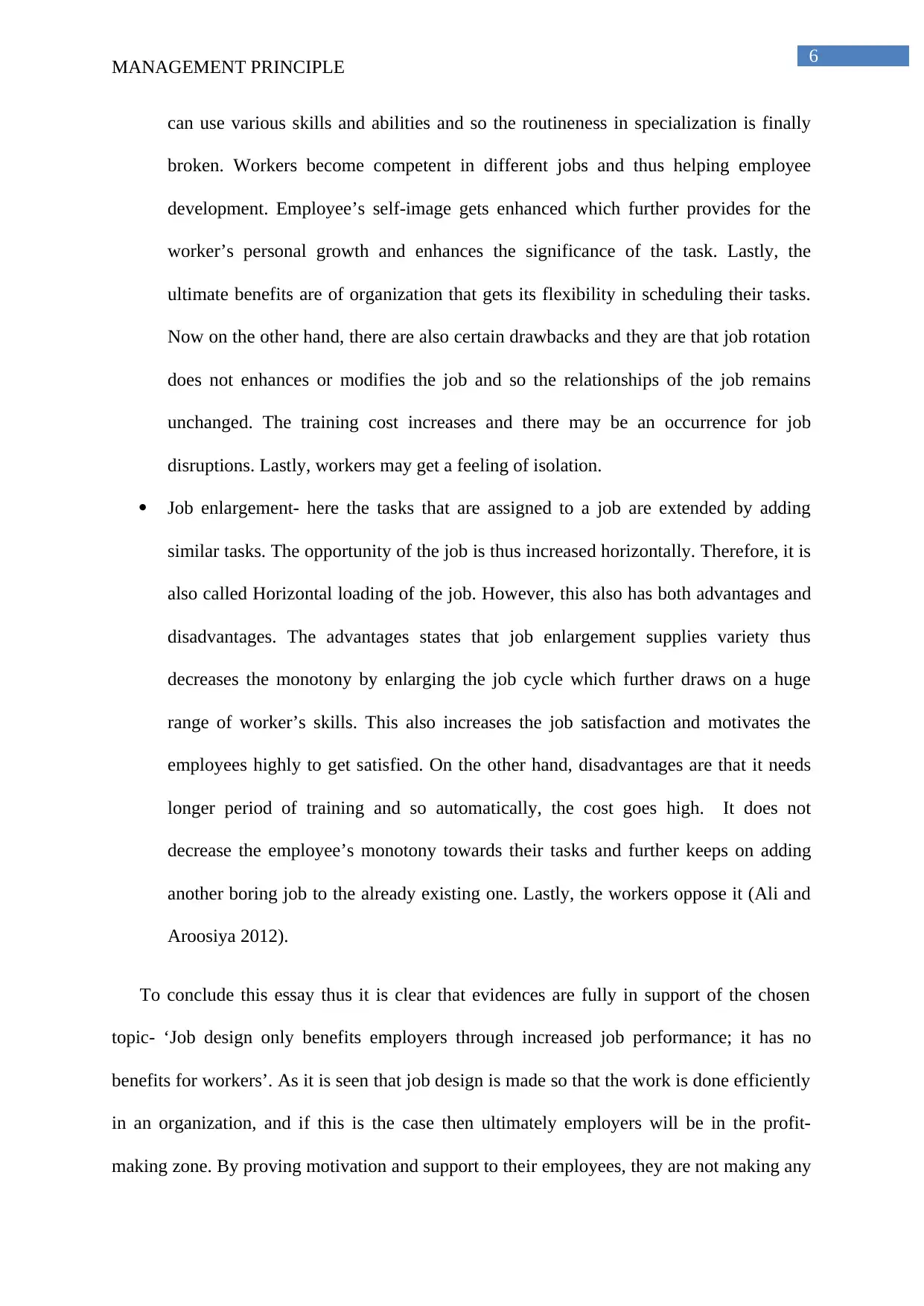
6
MANAGEMENT PRINCIPLE
can use various skills and abilities and so the routineness in specialization is finally
broken. Workers become competent in different jobs and thus helping employee
development. Employee’s self-image gets enhanced which further provides for the
worker’s personal growth and enhances the significance of the task. Lastly, the
ultimate benefits are of organization that gets its flexibility in scheduling their tasks.
Now on the other hand, there are also certain drawbacks and they are that job rotation
does not enhances or modifies the job and so the relationships of the job remains
unchanged. The training cost increases and there may be an occurrence for job
disruptions. Lastly, workers may get a feeling of isolation.
Job enlargement- here the tasks that are assigned to a job are extended by adding
similar tasks. The opportunity of the job is thus increased horizontally. Therefore, it is
also called Horizontal loading of the job. However, this also has both advantages and
disadvantages. The advantages states that job enlargement supplies variety thus
decreases the monotony by enlarging the job cycle which further draws on a huge
range of worker’s skills. This also increases the job satisfaction and motivates the
employees highly to get satisfied. On the other hand, disadvantages are that it needs
longer period of training and so automatically, the cost goes high. It does not
decrease the employee’s monotony towards their tasks and further keeps on adding
another boring job to the already existing one. Lastly, the workers oppose it (Ali and
Aroosiya 2012).
To conclude this essay thus it is clear that evidences are fully in support of the chosen
topic- ‘Job design only benefits employers through increased job performance; it has no
benefits for workers’. As it is seen that job design is made so that the work is done efficiently
in an organization, and if this is the case then ultimately employers will be in the profit-
making zone. By proving motivation and support to their employees, they are not making any
MANAGEMENT PRINCIPLE
can use various skills and abilities and so the routineness in specialization is finally
broken. Workers become competent in different jobs and thus helping employee
development. Employee’s self-image gets enhanced which further provides for the
worker’s personal growth and enhances the significance of the task. Lastly, the
ultimate benefits are of organization that gets its flexibility in scheduling their tasks.
Now on the other hand, there are also certain drawbacks and they are that job rotation
does not enhances or modifies the job and so the relationships of the job remains
unchanged. The training cost increases and there may be an occurrence for job
disruptions. Lastly, workers may get a feeling of isolation.
Job enlargement- here the tasks that are assigned to a job are extended by adding
similar tasks. The opportunity of the job is thus increased horizontally. Therefore, it is
also called Horizontal loading of the job. However, this also has both advantages and
disadvantages. The advantages states that job enlargement supplies variety thus
decreases the monotony by enlarging the job cycle which further draws on a huge
range of worker’s skills. This also increases the job satisfaction and motivates the
employees highly to get satisfied. On the other hand, disadvantages are that it needs
longer period of training and so automatically, the cost goes high. It does not
decrease the employee’s monotony towards their tasks and further keeps on adding
another boring job to the already existing one. Lastly, the workers oppose it (Ali and
Aroosiya 2012).
To conclude this essay thus it is clear that evidences are fully in support of the chosen
topic- ‘Job design only benefits employers through increased job performance; it has no
benefits for workers’. As it is seen that job design is made so that the work is done efficiently
in an organization, and if this is the case then ultimately employers will be in the profit-
making zone. By proving motivation and support to their employees, they are not making any
Paraphrase This Document
Need a fresh take? Get an instant paraphrase of this document with our AI Paraphraser
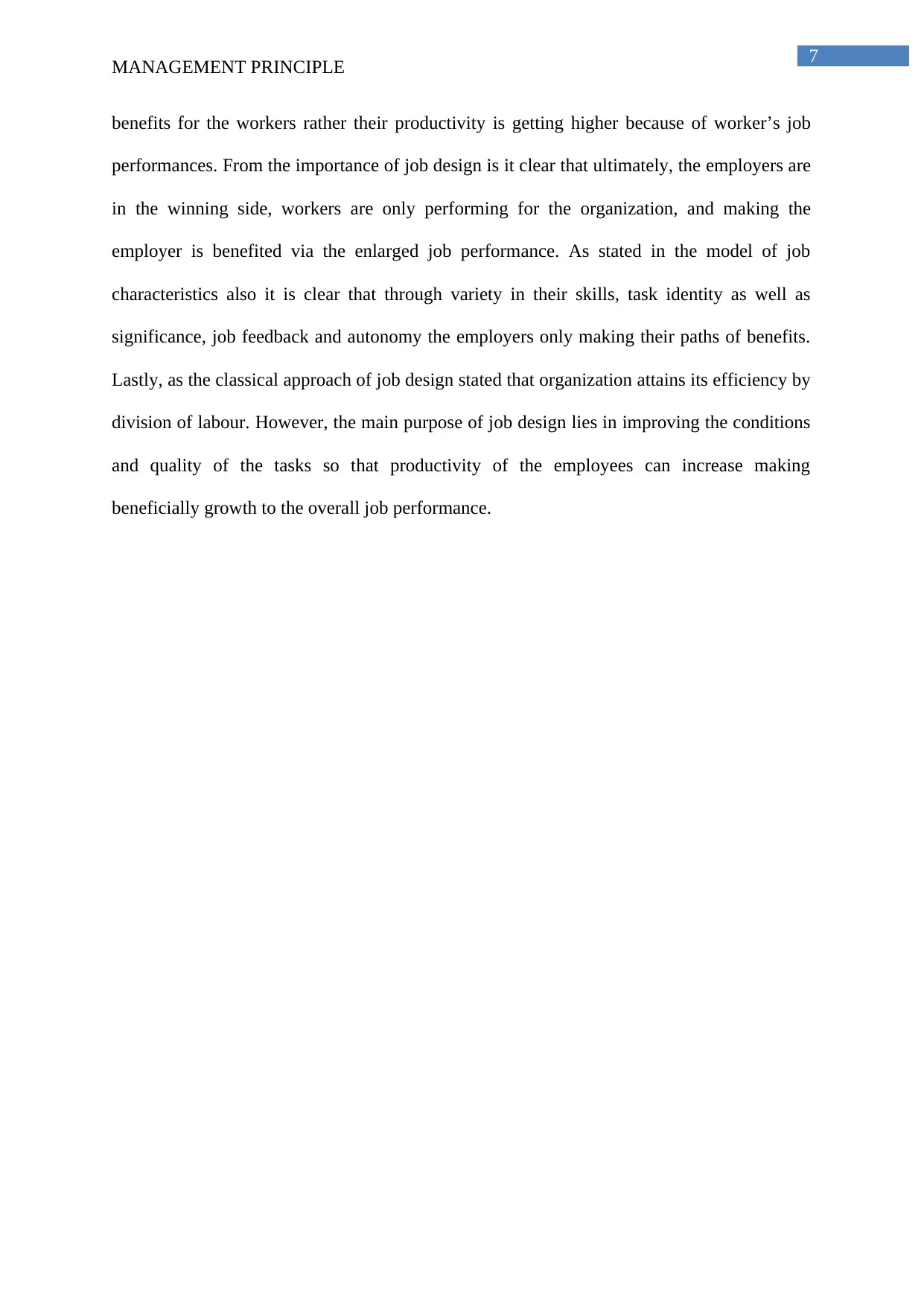
7
MANAGEMENT PRINCIPLE
benefits for the workers rather their productivity is getting higher because of worker’s job
performances. From the importance of job design is it clear that ultimately, the employers are
in the winning side, workers are only performing for the organization, and making the
employer is benefited via the enlarged job performance. As stated in the model of job
characteristics also it is clear that through variety in their skills, task identity as well as
significance, job feedback and autonomy the employers only making their paths of benefits.
Lastly, as the classical approach of job design stated that organization attains its efficiency by
division of labour. However, the main purpose of job design lies in improving the conditions
and quality of the tasks so that productivity of the employees can increase making
beneficially growth to the overall job performance.
MANAGEMENT PRINCIPLE
benefits for the workers rather their productivity is getting higher because of worker’s job
performances. From the importance of job design is it clear that ultimately, the employers are
in the winning side, workers are only performing for the organization, and making the
employer is benefited via the enlarged job performance. As stated in the model of job
characteristics also it is clear that through variety in their skills, task identity as well as
significance, job feedback and autonomy the employers only making their paths of benefits.
Lastly, as the classical approach of job design stated that organization attains its efficiency by
division of labour. However, the main purpose of job design lies in improving the conditions
and quality of the tasks so that productivity of the employees can increase making
beneficially growth to the overall job performance.
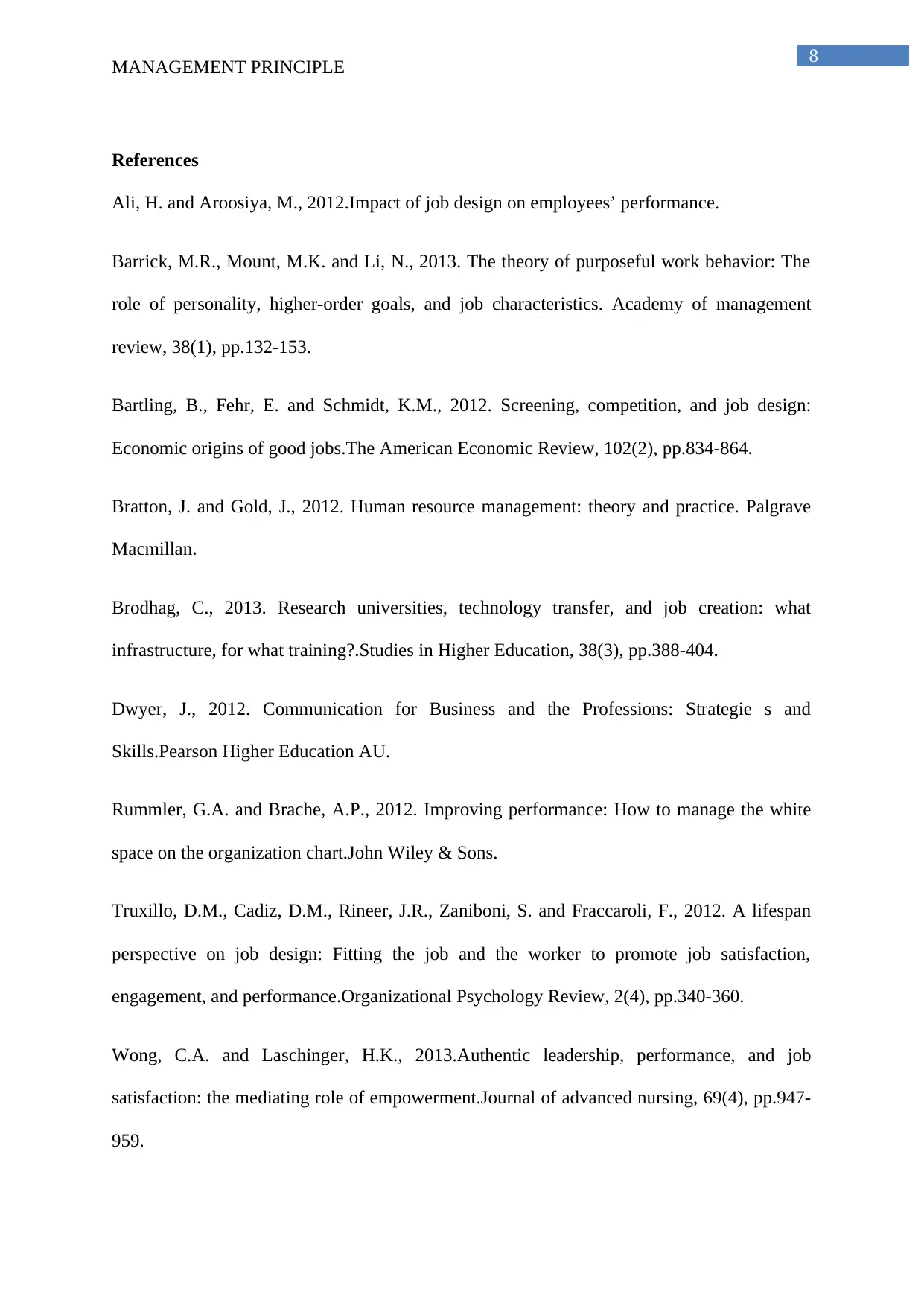
8
MANAGEMENT PRINCIPLE
References
Ali, H. and Aroosiya, M., 2012.Impact of job design on employees’ performance.
Barrick, M.R., Mount, M.K. and Li, N., 2013. The theory of purposeful work behavior: The
role of personality, higher-order goals, and job characteristics. Academy of management
review, 38(1), pp.132-153.
Bartling, B., Fehr, E. and Schmidt, K.M., 2012. Screening, competition, and job design:
Economic origins of good jobs.The American Economic Review, 102(2), pp.834-864.
Bratton, J. and Gold, J., 2012. Human resource management: theory and practice. Palgrave
Macmillan.
Brodhag, C., 2013. Research universities, technology transfer, and job creation: what
infrastructure, for what training?.Studies in Higher Education, 38(3), pp.388-404.
Dwyer, J., 2012. Communication for Business and the Professions: Strategie s and
Skills.Pearson Higher Education AU.
Rummler, G.A. and Brache, A.P., 2012. Improving performance: How to manage the white
space on the organization chart.John Wiley & Sons.
Truxillo, D.M., Cadiz, D.M., Rineer, J.R., Zaniboni, S. and Fraccaroli, F., 2012. A lifespan
perspective on job design: Fitting the job and the worker to promote job satisfaction,
engagement, and performance.Organizational Psychology Review, 2(4), pp.340-360.
Wong, C.A. and Laschinger, H.K., 2013.Authentic leadership, performance, and job
satisfaction: the mediating role of empowerment.Journal of advanced nursing, 69(4), pp.947-
959.
MANAGEMENT PRINCIPLE
References
Ali, H. and Aroosiya, M., 2012.Impact of job design on employees’ performance.
Barrick, M.R., Mount, M.K. and Li, N., 2013. The theory of purposeful work behavior: The
role of personality, higher-order goals, and job characteristics. Academy of management
review, 38(1), pp.132-153.
Bartling, B., Fehr, E. and Schmidt, K.M., 2012. Screening, competition, and job design:
Economic origins of good jobs.The American Economic Review, 102(2), pp.834-864.
Bratton, J. and Gold, J., 2012. Human resource management: theory and practice. Palgrave
Macmillan.
Brodhag, C., 2013. Research universities, technology transfer, and job creation: what
infrastructure, for what training?.Studies in Higher Education, 38(3), pp.388-404.
Dwyer, J., 2012. Communication for Business and the Professions: Strategie s and
Skills.Pearson Higher Education AU.
Rummler, G.A. and Brache, A.P., 2012. Improving performance: How to manage the white
space on the organization chart.John Wiley & Sons.
Truxillo, D.M., Cadiz, D.M., Rineer, J.R., Zaniboni, S. and Fraccaroli, F., 2012. A lifespan
perspective on job design: Fitting the job and the worker to promote job satisfaction,
engagement, and performance.Organizational Psychology Review, 2(4), pp.340-360.
Wong, C.A. and Laschinger, H.K., 2013.Authentic leadership, performance, and job
satisfaction: the mediating role of empowerment.Journal of advanced nursing, 69(4), pp.947-
959.
⊘ This is a preview!⊘
Do you want full access?
Subscribe today to unlock all pages.

Trusted by 1+ million students worldwide
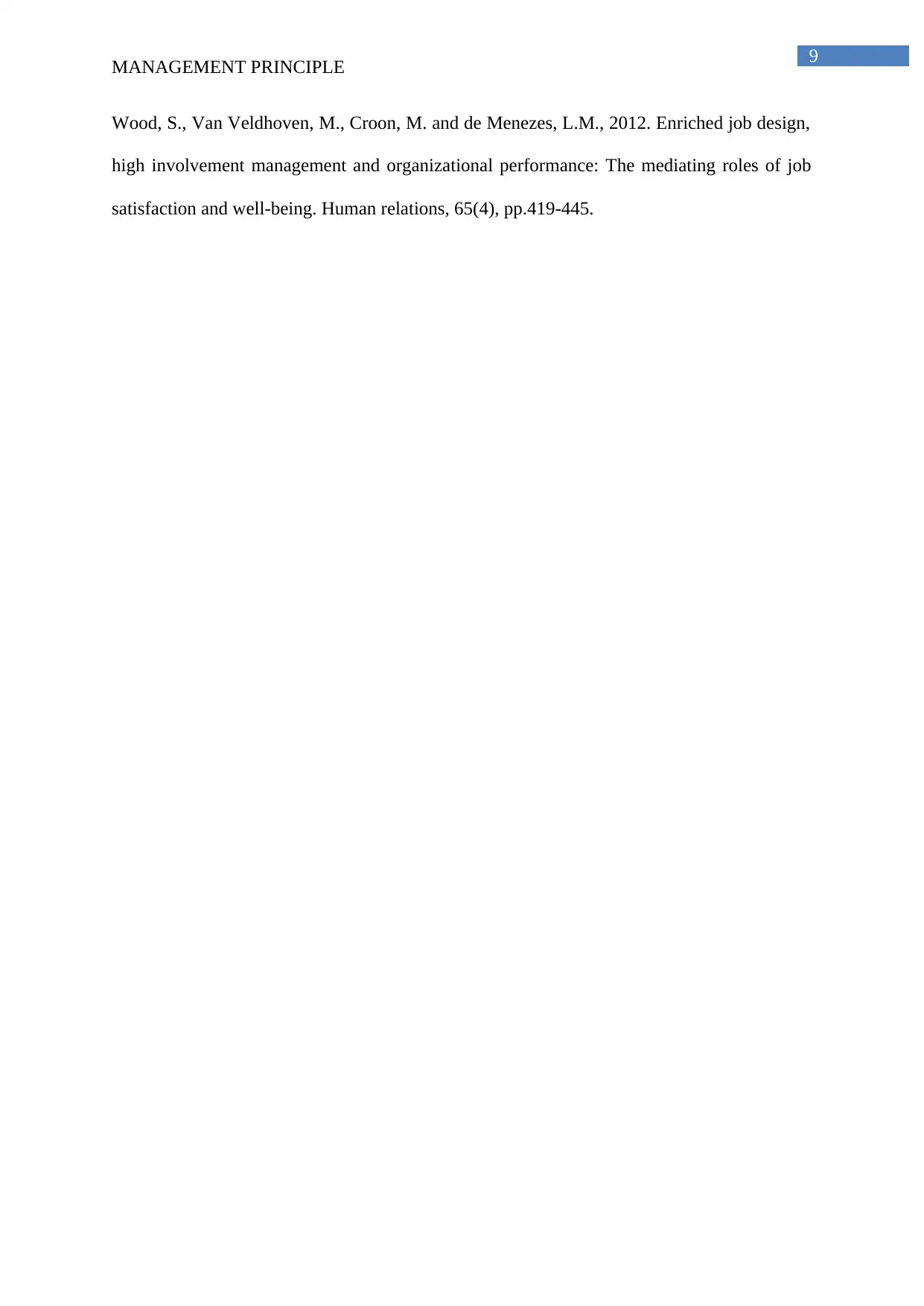
9
MANAGEMENT PRINCIPLE
Wood, S., Van Veldhoven, M., Croon, M. and de Menezes, L.M., 2012. Enriched job design,
high involvement management and organizational performance: The mediating roles of job
satisfaction and well-being. Human relations, 65(4), pp.419-445.
MANAGEMENT PRINCIPLE
Wood, S., Van Veldhoven, M., Croon, M. and de Menezes, L.M., 2012. Enriched job design,
high involvement management and organizational performance: The mediating roles of job
satisfaction and well-being. Human relations, 65(4), pp.419-445.
1 out of 10
Related Documents
Your All-in-One AI-Powered Toolkit for Academic Success.
+13062052269
info@desklib.com
Available 24*7 on WhatsApp / Email
![[object Object]](/_next/static/media/star-bottom.7253800d.svg)
Unlock your academic potential
Copyright © 2020–2026 A2Z Services. All Rights Reserved. Developed and managed by ZUCOL.





